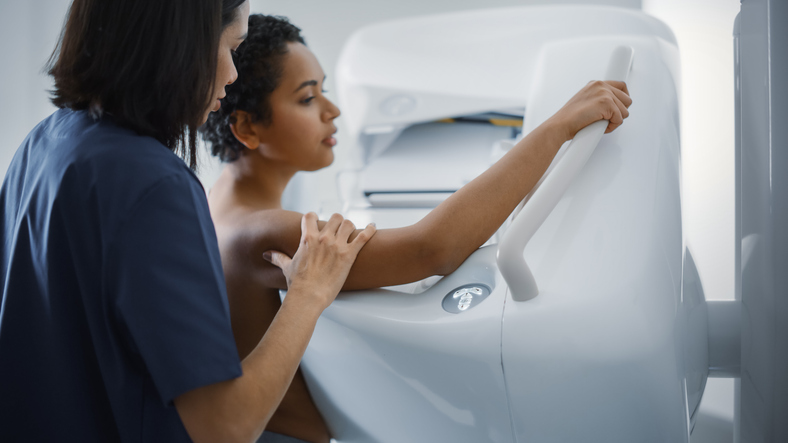When Emily Suttle-Braun received a breast cancer diagnosis three years ago, she met the challenge head-on. Despite her illness and the looming potential of infertility, pregnancy remained a priority.
But the path to motherhood is never a straight line, even without medical setbacks. While Suttle-Braun spent the next few years trying to conceive, she also birthed something entirely unexpected — a brand-new business called Doodle Mom Strategies.
Suttle-Braun has been gracious enough to share her story with Rescripted, with clinical insights about pregnancy after breast cancer provided by Caledonia Buckheit, M.D., a board-certified OB/GYN practicing in Raleigh, North Carolina.

The one-two punch: Breast cancer, followed by infertility
Back in 2022, Suttle-Braun was training for the New York City marathon when she “noticed a painful lump in [her] left breast” — but a mammogram only confirmed that she had “extremely dense” breasts. “Luckily, I had a female doctor who advocated for further diagnostic care,” she tells Rescripted, “and a surgical biopsy revealed Atypical Ductal Hyperplasia (ADH) and Ductal Carcinoma In Situ (DCIS),” the latter of which is an early form of breast cancer.
“For me, the choice was pretty easy,” Suttle-Braun says of her decision to undergo a double mastectomy: “‘Chop 'em off,’ I said to my doctor. I was ready to be a mom, and I wasn’t prepared to put my partner and future children through the alternative.”
Having faced breast cancer, and “thinking the worst was behind us,” Suttle-Braun then turned her attention to TTC. While Dr. Buckheit assures Rescripted that it is “absolutely possible to get pregnant and have a healthy baby after breast cancer,” with research showing that “survivors can go on to have successful pregnancies without increasing their risk of the cancer coming back or affecting their long-term health," Suttle-Braun’s road to motherhood was paved with multiple speed bumps.
“When you have a breast diagnosis in your 30s,” explains Suttle-Braun, “you undergo fertility testing.” It was at that point she learned about “those dreaded and all too familiar three letters in the infertility community — AMH.” AMH stands for anti-mullerian hormone, which reflects a woman’s egg count. While a normal AMH level for a 33-year-old woman (Suttle-Braun’s age at the time of testing) would be approximately 2.42 to 3.9 ng/mL, Suttle-Braun’s was 0.29 — which she says is “in the 45-49 age group.”
“Some treatments for breast cancer — especially chemotherapy — can affect the ovaries and make it harder to get pregnant, “ says Dr. Buckheit. “This might lead to reduced fertility or early menopause. Your age at the time of diagnosis and the type and length of treatment you had also play an important role.”
Dr. Buckheit also says that “most people are advised to wait at least two years after finishing chemotherapy before trying to get pregnant.” But since everyone’s case is different, she recommends speaking with both your oncologist and OB/GYN for a customized plan.
“If you’re hoping to have children after breast cancer, it’s important to see a fertility specialist before starting chemotherapy or other systemic treatments,” says Dr. Buckheit. “Fertility preservation options may include freezing eggs or embryos, preserving ovarian tissue, or using medications during chemo to help protect your ovaries.”
Suttle-Braun endured two years of what she calls “textbook infertility.” There were “several failed rounds of IUI, three egg retrievals yielding a small number of biopsied euploid embryos, several chemical pregnancies, and $120,000 in medical bills.”
Due to work obligations and the 24/7 demands of infertility management, Suttle-Braun decided to wait until after her wedding in England to try her first embryo transfer. But even the best-laid plans…

A surprise, then a setback
“I’ll never forget the moment I knew,” recounts Suttle-Braun. “I had planned a surprise dance for my husband to ABBA’s 'Super Trouper,’ and I have never been so out of breath.” Toward the end of the wedding reception, Suttle-Braun confided to her sister that she might be pregnant. “Two days later at Heathrow Airport, there it was — a positive test. Two weeks after that, we saw our baby’s heartbeat.
“Like a fool, I fancied myself a graduate of the infertility community, feeling sorry for those I had left behind and guilty for the years of worrying, when lo and behold, I had conceived naturally,” continues Suttle-Braun. But this pregnancy wasn’t meant to be: “Nothing can prepare you for a miscarriage, admits Suttle-Braun. “No amount of self-protection or waiting to decorate your nursery can prevent the heartbreak that ensues. Instead of our baby coming in the spring, the clock had reset. Instead of joining the ranks of the mamas, I was back in the crowd of outcasts.”

Living with infertility
Before she could move forward, Suttle-Braun needed to accept the central role that infertility would play in her life: “Infertility isn't waiting for a baby,” she observes. “Infertility takes over every part of life — physically, emotionally, financially. Every day is a checklist — appointments, injections, schedules, insurance calls, blood draws, ultrasounds, results. Every month is a chapter: weight loss, weight gain, bleeding, hot flashes, facial hair, depression. Adjust. Pivot. Go again. You're so focused on what comes next, you don't have time to feel what's happening now.”
Suttle-Braun realized she would have to work around her infertility on her terms, not anyone else’s. “The fear, the grief, the anxiety...it doesn't go away, it just waits,” she tells Rescripted. “It waits while you change as a person, questioning your body, your worth, and your future. And at the end of the day, it simply may or may not work out. It means living in a dual reality — one where it works, and one where it doesn't. I could no longer balance my full-time job and accountability to a company much bigger than myself with the personal hell I was in. I needed the ability to take on as much or as little work as I could manage. I needed the ability to be selective with my clients, only working with those who could respect the duality of my talents and the limitations of my situation.”
This need for career autonomy became the catalyst for her business, Doodle Mom Strategies.

The birth of Doodle Mom and looking ahead
“Despite over a decade working in sales, I never imagined I would build a business of my own,” says Suttle-Braun. “But the more I navigated the frustrating realities of healthcare, the more I realized how much women’s voices are missing from decision-making spaces — especially when it comes to funding, strategy, and scaling solutions that could actually improve lives.”
Enter Doodle Mom Strategies: “I took my years of experience in sales, politics, and advocacy and decided to apply them to causes that matter,” says Suttle-Braun. “I wanted to help progressive organizations, especially those working in reproductive rights, healthcare, and advocacy, sell their ideas, secure funding, and expand their impact. I knew firsthand how critical these organizations were, and I was determined to help them thrive.”
The irony of what Doodle Mom does is not lost on Suttle-Braun: “I built a business that helps others sell their solutions because I was tired of fighting to find solutions in my own life,” she says. “Sales, much like advocacy, is about storytelling. It’s about understanding the needs of the people you’re trying to reach, meeting them where they are, and showing them why they should care.”
Suttle-Braun understands the drive behind her clients’ work because, as she tells Rescripted, “I know what it feels like to be ignored. I know what it’s like to be told that something deeply important is not a priority. And I refuse to let my clients experience that.” Suttle-Braun wants her clients to feel confident: “At its core, my business is about power,” she says. “About ensuring that the organizations fighting for people like me have the resources, strategies, and connections they need to succeed. Because if we don’t actively invest in solutions, we’re left with the status quo: A world where women’s pain is an afterthought, where healthcare remains inaccessible, and where advocacy organizations struggle to sustain themselves.”
Although Suttle-Braun didn’t initially set out to start her own business, she also didn’t set out to endure “heartbreak, trauma, or an ongoing fight to grow [her] family.” But she’ll be the first to tell you that “life doesn’t follow a perfect script. It’s messy, complicated, and deeply human. And so is my business.”
Learning to expect the unexpected has allowed Suttle-Braun to navigate whatever comes next, and that includes more happy news: “As I write this, I am six weeks pregnant from my first embryo transfer,” she tells Rescripted. “I have no way of knowing if this pregnancy will work out, and I am prepared to relive the heartbreak that is all too familiar. What I do know is that whether or not I become a mother, this experience, this story that I did not ask to be a main character in, has changed my life.”

The good news for Suttle-Braun, as a cancer survivor, is that “getting pregnant does not increase your risk of breast cancer coming back,” says Dr. Buckheit. “Fortunately, multiple studies have shown that pregnancy after breast cancer is safe and does not raise your risk of recurrence.” Although Dr. Buckheit also confirms that a breast cancer history doesn’t increase the risk of birth defects or serious childhood illnesses, she does warn of a “slightly higher risk of pregnancy complications, such as preterm birth or low birth weight.” But your care team will monitor and manage those risks.
Suttle-Braun even credits her mastectomy with a newfound, albeit unforeseen, perspective: “When I said goodbye to my breasts, I had no idea I would be saying goodbye to years of weakness, low self-esteem, and insecurity. So, for now, at least something has been born out of all this.”
* As of this article’s publication, Suttle-Braun is in the second trimester of her pregnancy.
Sarene Leeds holds an M.S. in Professional Writing from NYU, and is a seasoned journalist, having written and reported on subjects ranging from TV and pop culture to health, wellness, and parenting over the course of her career. Her work has appeared in Rolling Stone, The Wall Street Journal, Vulture, SheKnows, and numerous other outlets. A staunch mental health advocate, Sarene also hosts the podcast “Emotional Abuse Is Real.” Subscribe to her Substack, the Critical Communicator, and follow her on Instagram, BlueSky, or Threads.






.jpeg)
.png)
.jpeg)

.jpeg)
.jpeg)

.webp)










